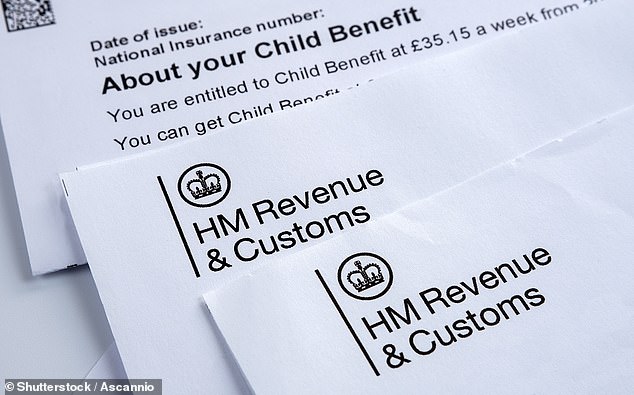I started claiming child benefit a few years after the old £50,000 limit was introduced. I had been earning below the maximum limit and my wife was earning around £5,000 part-time while she juggled the children.
I received a letter informing me that I was not entitled to child benefit because my net income was over £50,000 after taking into account the values of the pension and benefits in kind (my company car, fuel and care private medical).
I didn’t know my car and fuel benefit counted toward my calculated income. At the time my income was less than £50,000, but the values of benefits in kind pushed me beyond it.
I may be entitled to claim again now that the threshold is £60,000, but my employment benefits have changed. What else is included as income for these purposes?
Child benefit charge: Government starts recovering child benefit for those earning more than £60,000
This Is Money’s Angharad Carrick responds: Their situation shows how complicated the tax system has become.
The High Earner Child Benefit Charge was introduced in 2013 to recover child benefit from households where the highest earner had an income over £50,000, and withdraw it in full when they earned over £60,000.
From 6 April 2024, the lower threshold increased to £60,000 and is now withdrawn in full at £80,000.
In your case, you were earning below the previous threshold while your wife worked part-time and earned £5,000.
Unlike other taxes, the elimination of child benefit is based on the parents’ individual income, not their household income. Two parents earning £59,000 each would be eligible to receive the full amount, while a single parent earning £61,000 would not.
When the tax office looks at your income to assess how much child benefit you should receive, they don’t just look at your gross salary. Instead, they look at something called adjusted net income.
This can include income from employment, but also from other sources, such as rental property or investments.
Crucially, as in your case, it also includes any benefits you receive if you are employed, which are treated as taxable income. This includes things like a company car and health insurance, which are considered “benefits in kind.”
We asked three tax experts to further explain the rules.

Benefit in kind: company cars are included in taxable income and may affect your child benefit.
Robert Salter, partner at Blick Rothenberg, says: Sources of income you should consider when considering adjusted gross income for child benefit purposes are:
- Your gross salary (with deductions for pension contributions under net pay arrangements)
- Other employment income (for example, bonuses, overtime)
- Taxable benefits provided by your employer (basically anything declared on your P11D form: private medical benefit, company car, fuel benefit)
- Pension income (whether a private pension or state pension)
- Self-employment benefits (if any)
- Investment income (e.g. dividends, rental income, bank interest)
Items that would then be allowed as a deduction include:
- Pension contributions (for example, where you make contributions privately or where full tax relief has not yet been provided via form P60)
- Tax-deductible business expenses (for example, professional subscriptions or business mileage costs, where the individual covers the cost of these directly)
- Costs of the cycle to work scheme
This is standardized because, if you include some of the less common deductions that might be allowed when evaluating adjusted net income (such as losses carried forward from a prior year and qualified loan interest relief for the self-employed), all of this area can become very complicated.
Shaun Moore, tax and financial planning expert at Quilter, says: What counts as your taxable income can be confusing, especially if you receive in-kind benefits.
Taxable income includes not only your salary, but also various benefits provided by your employer.
For example, if you have a company car and they provide you with fuel for private use, the value of this benefit is included in your tax base. This is calculated based on the car’s list price, CO2 emissions and fuel type.
Similarly, the cost of private health insurance paid for by your employer is also considered a taxable benefit.
Electric cars have a lower taxable profit valuation compared to traditional petrol or diesel cars due to their environmental benefits. However, they still count as a benefit in kind and will increase your taxable income, although to a lesser extent.
Angharad Carrick says: You should also be careful about the interest accruing on any savings you have.
While you theoretically have a personal allowance of £500, this will be added to your adjusted net income.
This means that if you earned £60,000, the current child benefit threshold, and had £2,000 in savings interest, you would have to repay child benefit for the full £2,000.
This Is Money’s resident tax expert, Heather Rogers of Aston Accountancy, says: The adjusted net income calculation ignores any tax breaks you might receive and asks what your income is.
It looks at what your income is, regardless of whether it may be covered by a tax band or tax relief.
If you have a pension, you can deduct gross pension contributions from your income.
If you have a job of £100,000 and an income of £10,000 and interest and dividend income of £2,000, then you make a payment into a pension, then the gross value of that pension contribution can be deducted.
Some links in this article may be affiliate links. If you click on them, we may earn a small commission. That helps us fund This Is Money and keep it free to use. We do not write articles to promote products. We do not allow any commercial relationship to affect our editorial independence.


